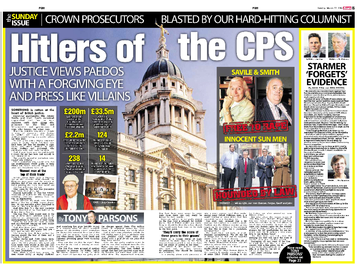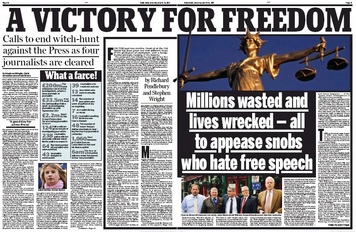

These were the promises made to Sun staff arrested for paying public officials for stories. The first came from Rupert Murdoch himself, secretly taped during a meeting with his journalists in March 2013. The second in an email from News UK chief executive Mike Darcey last year when crime reporter Anthony France was told he must face trial.
So what happened?
Most of the journalists were cleared - or at least not convicted - and the Crown Prosecution Service retreated from most of the outstanding cases, leaving former head of news Chris Pharo and reporter Jamie Pyatt alone in facing a retrial on a single count after a jury could not reach a verdict.
But one conviction stands - that of Anthony France, who was given a suspended prison sentence by a judge who described him as a decent man of solid integrity.
Judge Pontius made an order that France should pay £34,618 towards the prosecution costs - on the understanding that News UK would foot the bill.
Six weeks later France was back in court to hear his lawyer tell the judge that the company would not pay - and not only that, it was also considering disciplinary proceedings against him.
The judge was not pleased. Sun journalists routinely paid for stories, France had "inherited" his police contact, and the company had funded his defence "at considerable expense":
In these circumstances I’m concerned to learn that News International still refuses to put its hands into its capacious pockets and accept the consequences.
There can be no doubt that News International bears some measure of moral responsibility, if not legal culpability for the acts of the defendant.
But why did News UK refuse to cough up?
In that, it was being consistent. It did not pay Nick Parker's costs after his conviction for handling a mobile phone and it has said that it will not contribute to the hacking trial prosecution costs - Mr Justice Saunders made orders of £150,000 against Andy Coulson and £75,000 against Ian Edmondson last week.
There is a difference, though, between phone hacking - which everyone accepts was wrong - and paying contacts for stories, which has proved more of a grey area.
In that covert tape from 2013, later released by Exaro, Murdoch tells the staff:arrested under Elveden that he didn't know of anyone who had done anything "that wasn't being done across Fleet Street and wasn't the culture...Payments for news tips from cops, that's been going on for a hundred years".
Rebekah Brooks had previously told a Commons select committee that her papers had paid police for information, and several respected journalists piped up with anecdotes confirming that such payments had been common practice. Rival news organisations joined the condemnation of the Operation Elveden prosecutions and the celebration of acquittals.
The clue probably lies in the pauses in that Murdoch tape from two years ago; the hesitation when confronted with the question: what if we're convicted?
I'm not allowed to promise you...I will promise you continued health support...but your jobs...I've got to be careful what comes out...but frankly [big pause]...I won't say it...but...just trust me
Graham Dudman, the former managing editor who went on to be cleared of some charges and to have others against him dropped, pushes the point:
"Will News International be allowed to make a decision on whether somebody is retained in employment with the company or will that be taken by people in New York?"
Darcey, who has been asked this question in previous meetings, interjects: "We don't know what you mean by 'people in New York'. Were you specifically referring to the MSC?"
[The MSC was the Managements and Standards Committee set up in the panic after the Milly Dowler story broke, which went on to hand over millions of documents to the police, and which in turn prompted the broadening of the initial hacking investigation into payments to public officials.]
Dudman comes back: "The MSC or a News Corp lawyer who says 'No, Rupert, you can't do that. You've got to do this."
Murdoch assures him: "We all take legal advice. I'll take that decision. I'll take responsibility. Absolutely."
Pressed further by Dudman: "So you, as chairman, would be prepared to go against legal advice if you felt that was appropriate?", Murdoch replies: "Sure."
The question now is what advice Murdoch is getting in New York and whether he feels it is appropriate.
For, as he admitted himself, the whole MSC and its messy aftermath was the product of panic, a frantic attempt to protect the business - a business run from New York. And whatever Murdoch's protestations, there remains a
near-universal belief that fear of corporate governance and malpractice litigation in the US has driven every News Corp move over the past four years. To appear to condone law-breaking, whether by paying prosecution costs or by keeping a convicted journalist on the staff, is fraught.
One insider told SubScribe:

This is a legacy of the way so much corporate control was handed over to the MSC. Even hacks' London entertaining expenses have to be signed off in New York these days, Once you bring in the lawyers, you can never get rid of the buggers, as Rupert has been discovering.
We may yet see further examples of that obduracy.
The flurry of acquittals and the capitulation of the CPS may have been a cause for celebration, but they have brought a new set of problems: what to do with the journalists who are now free to resume their careers? You can't run a news organisation for two or three years without deputy editors, managing editors, news editors, picture editors, reporters. Others have stepped up to cover for the Elveden crew who have been catching up on their reading while suspended from work and on bail. And while Murdoch may have said that anyone acquitted would "naturally just continue", he probably wasn't expecting the process to drag on for a further two years.
So negotiations are underway at London Bridge. Older hands are looking for what are delightfully known as exit packages, younger journos with young families and big mortgages are looking to return, and those in the middle are trying to decide which way to jump.
Overlooking all of this is one Rebekah Brooks. Although she holds no official position, she remains close to Murdoch and is seen constantly at his side when he's in town. And while the lawyers are calling the shots in the negotiations, those who have met her have come away with the feeling that she has had some influence over the terms being offered.
What goes around comes around.
Four years ago Murdoch had to abandon his bid to take over the bit of BSkyB that he didn't own because of the hacking fallout. The company has since expanded into Europe and is now called simply Sky, the name Murdoch first gave it in 1984, long before the merger with British Satellite Broadcasting. In the past month, 21st Century Fox (which took control of the network when News Corp was split) has rebuffed approaches from Vodafone and Vivendi for its 39% share of the business, saying it wanted £18 per share - it is currently trading at around £11.31.
With a majority Tory government now in place, some analysts are predicting that Fox may be planning a fresh bid to take outright control.
The man who would ostensibly be in charge of any such bid would be the Fox chief executive: James Murdoch, former chief executive of BSkyB and - during its darkest days - of News International.
James took the helm at Wapping in 2011 when Rebekah Brooks resigned. Her£16m payoff is reported to have included a clause promising her a job of equal status should she be cleared of any criminal charges - which indeed she was.
So there she is now, in her upper floor office in the Baby Shard with no formal title. Mike Darcey is understood to be leaving the company in the autumn and, despite initial disbelief, there is a widespread expectation that Brooks will get her old job back.
As one observer noted: "It would be such a Rupert thing to do - rubbing his enemies' noses in it."
Which doesn't help Anthony France as he knuckles down to his next 100 hours of community service.









 RSS Feed
RSS Feed


